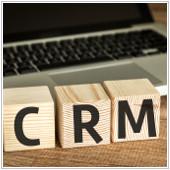 Building a rapport with customers has never been easier with customer relationship management (CRM) software. You can track contact information, buying preferences, and sales patterns. It’s a must-have for all sales and marketing teams. But if this is the first time you’re using CRM software, try adopting the following best practices.
Building a rapport with customers has never been easier with customer relationship management (CRM) software. You can track contact information, buying preferences, and sales patterns. It’s a must-have for all sales and marketing teams. But if this is the first time you’re using CRM software, try adopting the following best practices.
Always update customer information
A CRM system is only effective when the data it provides is current. If the customer’s address, company name, or preferred method of contact has changed, your staff should be recording this information immediately so your sales and marketing teams are always equipped with the right information.
Use purchasing history for upselling opportunities
It’s easier to sell to existing customers than acquiring new ones. Boost your sales performance by analyzing your existing clients’ purchasing history and designing promotions or events designed just for them. For example, if they recently purchased a razor from your online store, you can program your CRM to recommend related products like shaving cream or aftershave. Not only does this widen your profit margins, it also makes customers’ lives a lot easier and promotes repeat business.
Automate processes
Take advantage of the workflow automation features in CRM apps to eliminate time-consuming and repetitive tasks. For instance, when a new lead is added to your CRM (via newsletter subscriptions or website visits), the CRM can be programmed to send follow-up emails, offer promotions, and other interactions to keep your business at the forefront of their attention. This saves you from writing the same canned responses while also making sure that you’re engaging your clients throughout the entire sales process.
Learn from analytics
CRM also makes it possible to analyze customer trends and behavior. If you noticed a spike in demand for certain products and services during the holidays, be more aggressive in pushing them out next year. If certain email campaigns were more successful than others (e.g., higher open rates, click-through-rates, and potential customers), understand what elements were responsible for that success and try to replicate them the next time you send a newsletter.
Customer data should also be used to shape sales and marketing tactics. A salesperson that already knows the client’s name, locations, and preferences can deliver more personal sales pitches and has a better chance of closing a deal. The point is this: If you’re not learning from your data, your business growth will be limited.
Integrate CRM with other business software
Tying CRM software to other programs makes it even more powerful. Integration with accounting software combines customer and financial data, eliminating redundant manual data entry and providing more insightful reports. When used alongside a VoIP system, your staff will get relevant customer information from multiple databases displayed on one screen when they’re about to make a call.
Get some CRM support
Last but not least, work with a CRM provider that offers 24/7 support. Ideally, they should be keeping your data safe, updating your software regularly, and advising you on how to use complex CRM features.
This may seem like a lot, but the important thing to remember is that just like every technology investment, CRM requires active participation from executives, managers, and frontline staff. If you need more advice on keeping customers happy or want to know what technologies can add value to your business, call us today.



 If you have ever received what looked like a personalized email from a huge corporation, there’s a good chance it was actually written with the help of an email automation platform. Email automation saves time and money while strengthening customer relationships, and contrary to popular belief, it is well within most SMB budgets.
If you have ever received what looked like a personalized email from a huge corporation, there’s a good chance it was actually written with the help of an email automation platform. Email automation saves time and money while strengthening customer relationships, and contrary to popular belief, it is well within most SMB budgets.
 Marketing automation was once a technology reserved for mega corporations and enterprise-level businesses. Fortunately, the IT industry is making business tools cheaper and more accessible all the time. Nowadays, if you’re a small business owner, you’d have to be crazy to pass up all that marketing automation has to offer. If you haven’t already implemented this wonderfully profitable technology, read up on the five best reasons to do so here.
Marketing automation was once a technology reserved for mega corporations and enterprise-level businesses. Fortunately, the IT industry is making business tools cheaper and more accessible all the time. Nowadays, if you’re a small business owner, you’d have to be crazy to pass up all that marketing automation has to offer. If you haven’t already implemented this wonderfully profitable technology, read up on the five best reasons to do so here.
 As the saying goes, “absence makes the heart grow fonder.” If oceans were to separate you from your loved ones, what would you do? Would you communicate as much as you used to? Would you still check in from time to time? Now, apply this sentiment to your business; what would happen if communication with your customers broke down? Following up on orders or keeping track with progress would become a nightmare – it’s time for CRM software to save the day:
As the saying goes, “absence makes the heart grow fonder.” If oceans were to separate you from your loved ones, what would you do? Would you communicate as much as you used to? Would you still check in from time to time? Now, apply this sentiment to your business; what would happen if communication with your customers broke down? Following up on orders or keeping track with progress would become a nightmare – it’s time for CRM software to save the day: